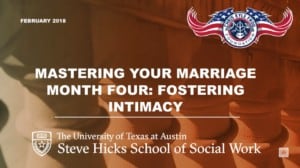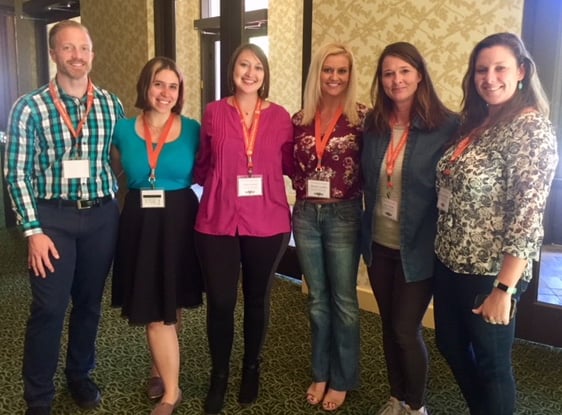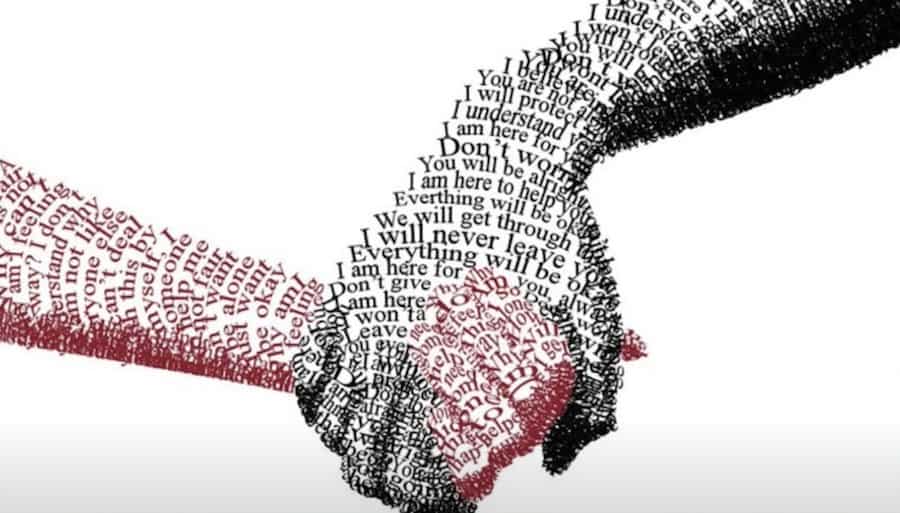One evening this spring, social work student Dana Larson was making calls to veterans and their spouses. She asked one of these couples whether they had been able to plan for “knee-to-knee time” together.
“It is about literally sitting down knee-to-knee, holding hands, and talking about how they are feeling, what they are thinking, and something they are looking forward to,” Larson explained. “It’s a quick and simple tool, but it can be very effective in helping spouses re-connect with each other.”
Larson was thrilled to learn that the couple had been able to set time aside for the activity on a regular basis and that, as they put it, they felt that “they were not walking through a fog anymore in relation to their marriage.”

“Knee-to-knee” time is just one strategy among many others that Larson recommends to veterans and their spouses as part of Mastering Your Marriage, a pilot program launched in the fall of 2017 as a partnership between the Chris Kyle Frog Foundation and the Steve Hicks School of Social Work.
The six-month marriage enrichment program began with a weekend orientation retreat last fall, and has continued with monthly releases of targeted content through a mobile phone and computer app, on topics such as conflict resolution, communication, and intimacy. The content usually includes short videos and webinars as well as homework and worksheets that the couples complete. A few times per month, the couples also come together in small, virtual discussion groups to share their progress and questions. Finally, they will have a chance to come together during a capstone retreat this coming May. There are currently 20 couples participating in the program, and they come from all over Texas — from Killeen to Victoria to Dallas.
“Mastering Your Marriage was designed as a ‘retreat plus’ concept because many military couples who attended weekend-long marriage retreats reported wanting more. This program is piloting a new curriculum that gives them this extra, longer term support,” said Elisa Vinson Borah, a research associate professor at the Steve Hicks School of Social work and director of the program.
Larson and Shira Hecht, both in the master’s program at the Steve Hicks School of Social Work, joined Borah’s team as field practicum students. They are the main point of contact for the couples — through making follow-up phone calls and facilitating the virtual discussion groups — and they contribute to other aspects of the program such as content development and program evaluation.
“It has been amazing. I am not only getting clinical experience but also seeing how a project like these runs in the background: what it takes to run a pilot study, what grant-writing looks like, what recruitment and budgeting look like, how policies impact what couples can do… I don’t think many people get that experience,” Larson said.

Hecht added that it has been fascinating to collaborate with the Chris Kyle Frog Foundation and learn from their work with military couples.
“You get to work with people that bring different perspectives from your own to the table, and we are all trying to do something that is helpful for as many people as possible. Even if the collaborative process sometimes is complicated, it has been an invaluable experience and I know that I will use it after graduate no matter what I end up doing,” Hecht said.
Hecht, who is graduating in May, chose the internship with the Chris Kyle Frog Foundation because of her previous interest in trauma.
“This seemed like an opportunity to work with trauma as well as helping couples have healthy relationships. I want to do trauma work in the long term, and I thought that having experience with military populations would be really helpful,” Hecht said.
For Larson, who still has another year in the master’s program, the internship is the perfect complement to her job with STRONG STAR, a research consortium at Fort Hood that focuses on finding effective treatments for posttraumatic stress disorder and sleep disorders. After graduating, she hopes to become a liaison between the military, a university campus, and the Veterans Health Administration.
“I’ve fallen in love with this job and working with the military,” Larson said. There is a shared connection, language and culture in the military community. I really appreciate that, it’s this binding force that holds together all these individuals with different personalities and wants and desires. I really love that.”
By Andrea Campetella. Posted March 12, 2018.


